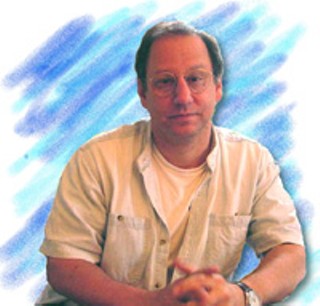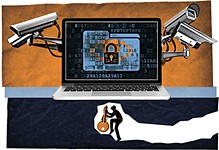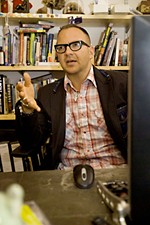Come Together: "Pieces" of David Weinberger
By Jon Lebkowsky, Fri., Feb. 28, 2003

David Weinberger co-authored The Cluetrain Manifesto, and more recently he's written Small Pieces Loosely Joined: A Unified Theory of the Internet, a philosophical exploration of our experience of the World Wide Web.
Austin Chronicle: You taught philosophy, then got into marketing. That's pretty weird in itself -- but now you're evangelizing about technology, as well. How do these pieces join, other than loosely?
David Weinberger: It's actually not as random as it seems. Throughout all those periods, I've been a writer -- about philosophical issues, products and companies, or technology. And my interests have been distressingly consistent also: I'm fascinated by the ways in which our thinking about ourselves goes so far out of alignment with the way we live our lives. For example, I'm amazed that we think it's obvious that the brain is like a computer running software. Consciousness is so not like software!
AC: How did that fascination lead you to write Small Pieces? Or is that a whole other thread?
DW: No, it's exactly the same thread. There's an excitement about the Web that's rare for a technology. It seems to me to be touching something deep in our culture. In fact, there's a conundrum: The Web is both weird and familiar. It's weird in all sorts of ways, starting with the fact that we're generally anonymous on it, and yet we get to sound like ourselves. We make friends that we've never met. So it's weird, yet over 500,000,000 people worldwide have jumped on, which generally doesn't happen when a technology is weird. It's almost as if the Web experience is reminding us of something. Small Pieces Loosely Joined tries to figure out the conundrum and says that the Web is reminding us -- in some ways -- of what it is to be a human being.
But why do we need to be reminded? We never really forgot. But when we think abstractly about who we are, our thinking goes wildly wrong. We have theories about what it means to be human that seem to me to have little to do with how we actually live our lives. The Web reminds us.
AC: For example?
DW: Well, just listen to the sorts of things we say in this country about being an individual. Not only is individualism the highest virtue, we talk as if only individuals are real. "Take away the individuals and there is no group," as if that proved that groups aren't real.
But it's at least as true that if there weren't groups -- society, our culture -- we couldn't be individuals. We wouldn't have language. We'd be howling monkeys, except not as social. The architecture of the real world lets us get away with making that mistake because it sometimes seems like the point of geology is to keep us apart. But the architecture of the Web is built out of links, connections. The Web is literally nothing without links and without humans posting ideas and feelings that are intended to connect with others. So, in that sense it seems to me that the Web's architecture better reflects our own interhuman nature.
AC: Do you see a contradiction between this thinking -- that the Web enhances our humanity -- and the fact that when we're online, we're physically isolated?
DW: The bodilessness of the Web is both a strength and a weakness, sometimes as two sides of the same coin. For example, not having a body online means that our public appearances don't have to get tied back to the same persistent self. That's liberating because it means I can more easily allow various aspects of who I am to emerge, but it can also be dangerous because there's little restraining me from letting shards of my personality fly off to extremes. But I don't mean to be too balanced here: The bodilessness of the Web means that we're able to engage people without regard to distance or to the color or shape of their bodies. Also, the fact that our bodies are safe in their chairs in front of the computer monitor removes a huge element of personal risk; we can be hurt in various ways on the Web, but we can't get our noses broken.
AC: Changing the subject slightly, I know you've thought a lot about the Web and politics. Many people believe that the Web supports democracy. Do you agree?
DW: The Internet is democratic in the best sense, although I think its political efficacy is still in question. The Net's democratic in that it gives everyone an equal voice and allows groups to form fluidly in ways that the group itself determines. Sure, big money can buy big sites, but the barrier to presenting your ideas in public is much lower on the Net, so we can find a million other voices besides the stately tones of CNN or The New York Times. But what sort of effect is that having on real-world politics? Some. We're better informed. We can organize globally more efficiently. And, most important, we can make fun of politicians far more effectively. But the old political parties and power structures remain basically unaltered, fighting the old fights in the old ways.
David Weinberger will deliver the festival's opening remarks on Saturday, March 8, 2-3pm.








